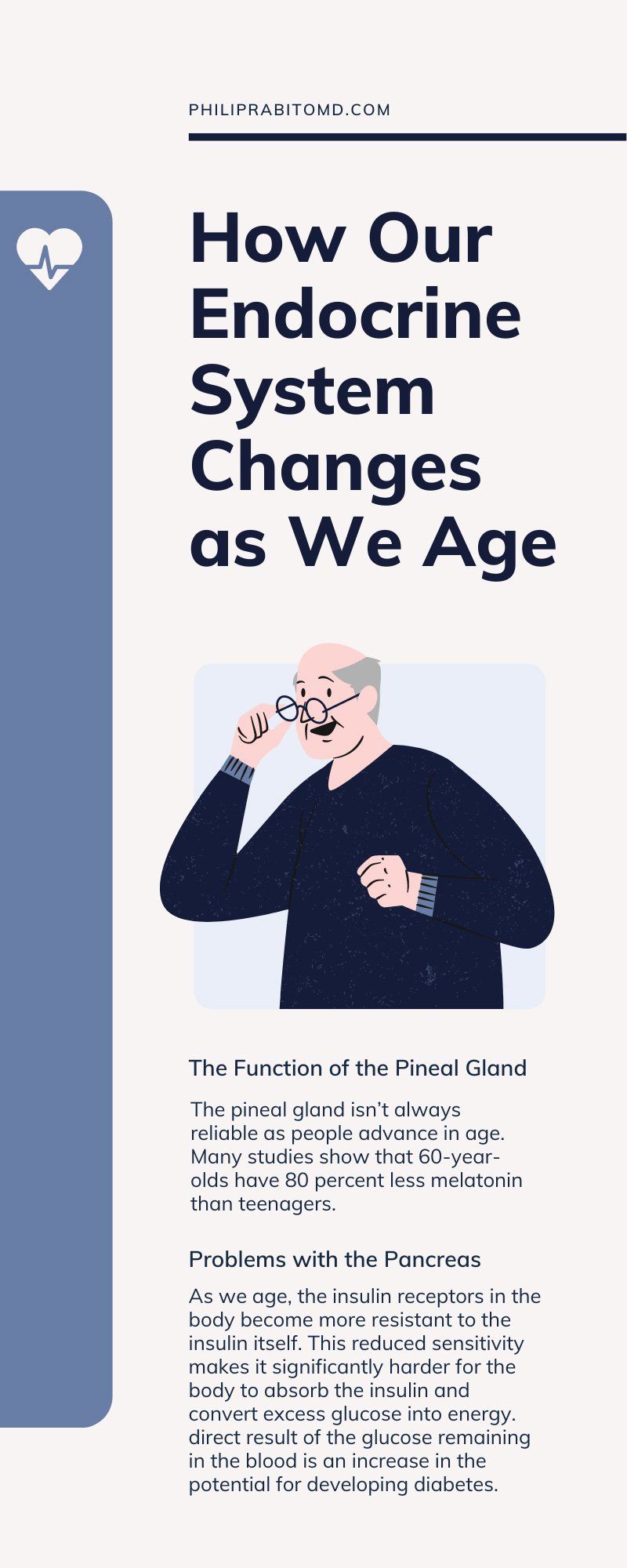
The body’s endocrine system is a collection of complex organs that facilitate hormone production and regulation. It’s a delicate system that needs to maintain a crucial balance in our bodies; if the system were to ever go out of balance, it could have significant health side effects. But the endocrine system is not something that remains static throughout our entire lives. It’s important to know how our endocrine system changes as we age, what we can expect from those changes, and what we can do to mitigate the symptoms.
Don’t let the natural changes inside your body catch you off guard—bodily hormones continue to change long into adulthood. Have an understanding of how your body works and know where to go for medical answers regarding bodily chemical alterations.
The Function of the Pineal Gland
The pineal gland, located in the center of the brain, is largely responsible for our sleeping patterns and how easily we fall asleep. To regulate our sleeping patterns, the pineal gland secretes melatonin, a chemical that relaxes the body and brings about tiredness. Melatonin production relies on the amount of sunlight the body absorbs—when there is an excess of UV rays, melatonin production slows to a halt. But during the night, when there is little to no UV light, melatonin production commences, filling the body with the sleeping chemical.
How Does the Pineal Gland Change?
Sleep is a critical part of a healthy body; it’s a time for the body to relax and for the brain to decompress after a long day. However, the pineal gland isn’t always reliable as people advance in age. It goes through a calcification process, which reduces its effectiveness and significantly affects melatonin production in the body. This calcification process can take years to develop and most often starts affecting people when they reach the age of 60. Many studies show that 60-year-olds have 80 percent less melatonin than teenagers.
What results from the reduced functionality of the pineal gland is an interruption to sleep patterns, making it more difficult for individuals to fall asleep. Because their bodies don’t get the necessary amount of melatonin, older individuals can take longer to fall asleep and have shorter, more easily disturbed sleep cycles. In the worst cases, pineal calcification can lead to severe insomnia, making it nearly impossible to achieve deep sleep.
How To Combat Pineal Issues
Any pharmacy will have over-the-counter remedies for sleeplessness, such as pills and other medications to increase melatonin production. These quick fixes benefit people of all ages and are often the most convenient solutions. For more serious sleeping and pineal issues, however, you’ll need to contact your doctor for more in-depth care plans.
The Thyroid and How It Affects Metabolism
One of the most common issues people face from their endocrine systems stems from the thyroid gland, a structure located in the throat that controls the body’s metabolic rate. The chemicals the thyroid releases dictate metabolism, or how quickly the body converts food and liquids you consume into energy. A faster metabolism will break down those calories quickly, maintaining high energy and a more frequent consumption rate. Conversely, a slower metabolism takes longer to break down food, potentially leading to lower energy levels. Whatever the case may be for the individual, the thyroid’s most prominent responsibility is the regulation of metabolism.
How Does the Thyroid Change?
Older individuals commonly experience autoimmune responses to the thyroid gland that can potentially attack the thyroid. This can cause damage to the thyroid and lead to a condition called hypothyroidism, a slowing down of the metabolic rate. When metabolism slows down, this can lead to the body taking longer to break down calories, resulting in sudden weight gain. Other symptoms can include increased fatigue, sensitivity to colder temperatures, and weakness in the muscles.
How To Combat Thyroid Issues
People with thyroid issues will need to make adjustments to their lifestyles and dietary choices. For people with lower metabolic rates, consuming more iodine and zinc is necessary to promote greater hormone production in the thyroid. Before anything, however, you’ll need to consult an endocrine and metabolism specialist to fully understand your condition. The thyroid gland is a tricky organ, and managing it requires the expertise of a medical professional.
Problems with the Pancreas
The pancreas’s primary function is to regulate blood glucose levels, producing the chemical insulin in response to high levels of glucose. Once insulin secretes into the bloodstream, the glucose metabolizes and releases as energy into the body. This process ensures the blood doesn’t contain high amounts of sugar, purging the body of excess glucose and using it as energy instead or else storing the glucose in fat cells for later.
How Does the Pancreas Change?
As we age, the insulin receptors in the body become more resistant to the insulin itself. This reduced sensitivity makes it significantly harder for the body to absorb the insulin and convert excess glucose into energy. As a result, the glucose is left behind in the bloodstream. A direct result of the glucose remaining in the blood is an increase in the potential for developing diabetes.
How To Combat Pancreas Issues
Because of the severity of developing diabetes, it’s best to consult your doctor immediately if you suspect pancreas issues. Be aware of the symptoms associated with diabetes as early warning signs that your pancreas is experiencing issues. Those symptoms include:
- Excessive thirst
- Frequent urination
- Sudden and unexplained weight loss
- Numbness and tingling in the hands and feet
Know Your Body and Its Processes
It’s essential to know how your endocrine system changes as you age. Being aware of these issues can help you find solutions and the necessary care before they grow worse. Bodily health should be your top priority as you age, and the endocrine system presents many complications and medical challenges. Don’t let yourself fall into poor health due to ignoring the warning signs of a changing body—seek out professional help as soon as you notice troubling symptoms.


